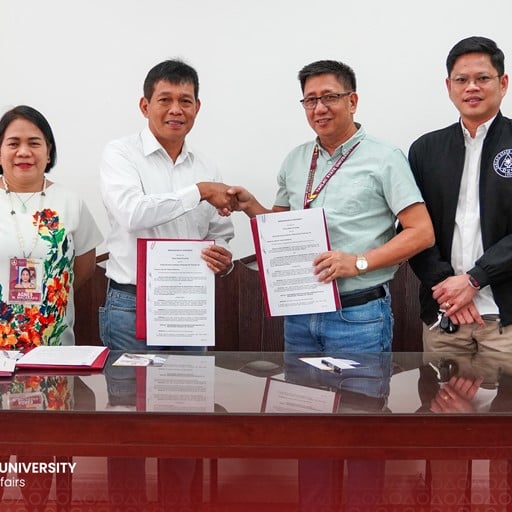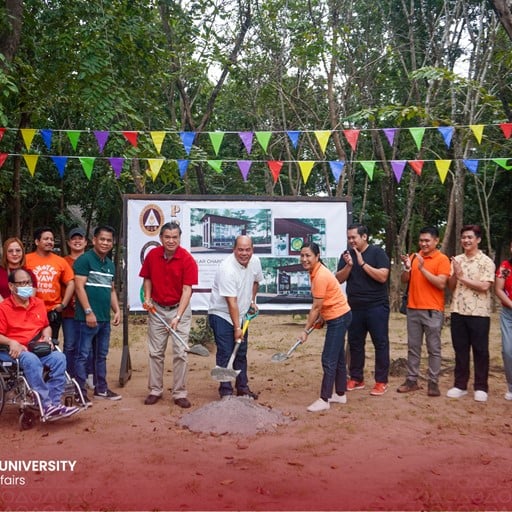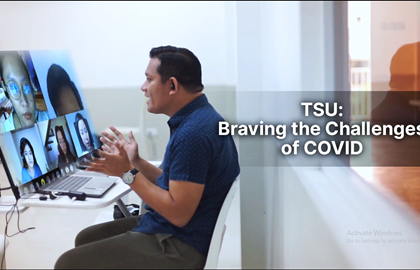In its fourth year, the Office of Innovation and Business Development led the conduct of the Saliksiklaban 4, a university-wide undergraduate research competition, with 22 entries from the ABLESS and STEM categories, on May 2-3, 2024, at the Lucinda Campus.
The annual undergraduate student research competition is anchored on the Sustainable Development Goals, particularly quality education (SDG 4), gender equality (SDG 5), reduced inequalities (SDG 10), sustainable cities and communities (SDG 11), and partnership for the goals (SDG 17).
It aims to discover students' research capabilities and identify outputs that can impact the community, where the OIBD (formerly OTDTC) would assist in the process of copyright and transfer to communities that need it.
"Embrace the learning experience that you will gain in this competition and maganda nga po you will be motivated. Keep in mind that research competitions offer opportunities for learning, personal development, networking, and [an] additional chance to compete...You will have the chance [to compete] in other venues nationally and internationally," TSU President Dr. Arnold E. Velasco said.
Out of the 13 entries under the ABLESS category, the study of a student research group from the College of Architecture and Fine Arts, titled Centro Kabyawan: Redefining Local Tourist Experience through Agro-Creative Tourism Model," was awarded first place.
Meanwhile, the winner under the STEM category is the group from the College of Engineering with their research, "Improvement of the Existing Unconfined Compression Apparatus with Soil Bearing Capacity and Shallow Square Footing Analysis System." The group also received the best poster award in the said category.
According to Cheska Gragasin, a fourth-year mechanical engineering student and one of the proponents of the research "Utilization of Vortex-Mechanism in an Organic Compost Tea Brewing Machine for Sustainable Soil Conditioning" that won third place in the STEM category, they are targeting to help small scale farmers in the Tingtano Farm in San Jose, Tarlac.
Gragasin said the organic compost tea brewing machine can produce 80 liters of compost tea in 24 hours, which can condition 110 sq.m. of soil.
Aside from the major awards in each category, the Office of Gender and Development recognized the "most gender-sensitive" research papers and other gender-related studies.
The ABLESS category research outputs were evaluated by Prof. Michael Charleston B. Chua, a public historian from Tarlac and professor from De La Salle University; Dr. Jessie Barrot, National University-Clark Research and Development Office assistant vice president; Dr. Jean Paolo Lacap, City College of Angeles' Research, Extension, and Quality Assurance vice president and president of Pampanga Research Educators Organization.
The panel members for the STEM category are Dr. Michael Lochinvar Abundo, SAAB-NTU Joint Lab assistant director and program manager; Engr. Aldrez Aviso, Intellectual Property Office of the Philippines intellectual property rights specialist; and Engr. Edward Paul Apigo, Department of Science and Technology senior science research specialist.
“Masaya ako that you showed sensitivity. A lot of the research have asked 'Ano ba 'yung pangangailangan niyo? Ano 'yung tingin niyo sa kultura niyo? Ano 'yung tingin niyo sa dapat mangayari sa lipunan natin?' that's why you were able to come up with these very beautiful researches and I am very proud to call na I’m from this province," Prof. Chua, ABLESS category evaluator, told the student researchers.
Chua also suggested writing studies using the Filipino language and indicated that some outputs could be distributed to the Center for Tarlaqueño Studies for future reference of the historians.
Cash prizes for the ABLESS category are 10,000 pesos for the first placer, 7,000 for the second placer, and 5,000 for the third placer.
On the other hand, the top three STEM groups received 20,000, 15,000, and 10,000 pesos.
GAD allotted cash incentives for the most gender-sensitive research papers amounting to 5,000 pesos for the first prize, 4,000 for the second prize, and 3,000 for the third prize.
Both categories were given an additional 1,000 peso cash prizes for gender-related research papers.
The OIBD's partners in organizing the Saliksiklaban 4 are the Office of University Research Development (OURD) and GAD.
List of Winners
|
|
STEM |
ABLESS |
|
1st place |
Improvement Of the Existing Unconfined Compression Apparatus with Soil Bearing Capacity and Shallow Square Footing Analysis System (COE)
*Best Poster |
Centro Kabyawan: Redefining Local Tourist Experience through Agro-Creative Tourism Model (CAFA) |
|
2nd place |
Efficacy of Eucalyptus (Eucalyptus globulus), Papaya (Carica Papaya) Leaves, and Lanzones (Lansium Domesticum) Peels in Developing Organic Mosquito Coil (COS) |
Development of Pinoy Pedagogical Model for Community Engagement Solidarity and Citizenship (COED) |
|
3rd place |
Utilization of Vortex-Mechanism in an Organic Compost Tea Brewing Machine for Sustainable Soil Conditioning (COE) |
A School of Living Traditions: Reinvigorating Indigenous Knowledge of Ayta Abellens of Sta. Juliana Capas, Tarlac (CAFA)
*Best Poster |
|
|
Design and Development of a Solar-Powered Paddy Grain Dehydrator Using Infrared Light (COE) |
|
|
Most Gender Sensitive Research Paper |
STEM |
ABLESS |
|
1st place |
Perceived Effects of Biomedical Waste Incineration on the Health, Safety, Quality of Living and Environment among Selected Residents of Capas, Tarlac (COS) |
Lived Experiences of LGBTQIA+ Employees Among Government Offices in Tarlac Province (CPAG) |
|
2nd place |
|
Paghilom: A Redevelopment of Tarlac Home for Women to Reimagine Healing Spaces for Vulnerable Women (CAFA) |
|
3rd place |
|
Interplay of Opposites: A Relational Dialectics Exploration of the Mother-Daughter Tensions in the film Lady Bird (CASS) |
(jlmm-OPA)
Photo by Franc Lewis R. Juanatas








